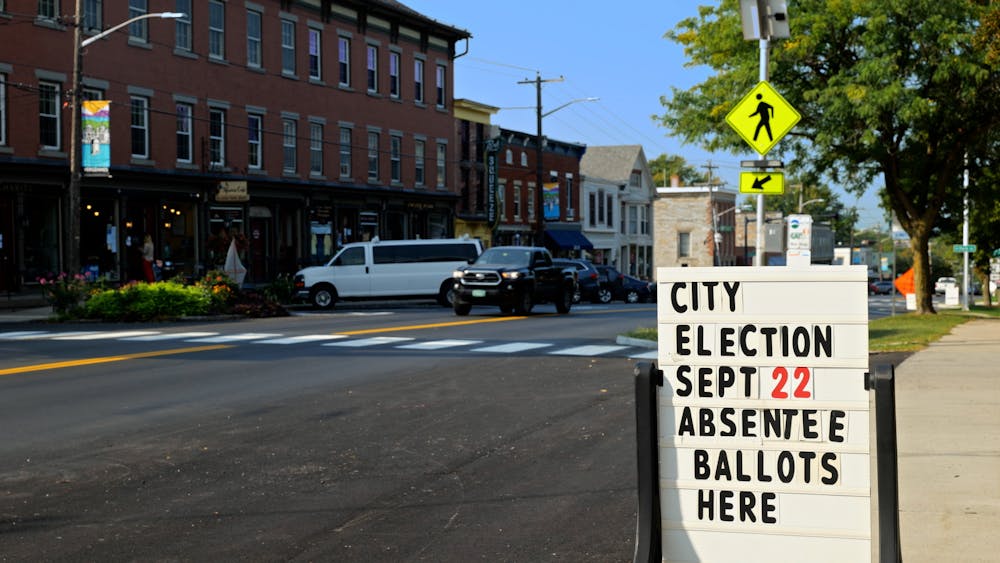I recently had the opportunity to attend a screening in Dana Auditorium of “The Price of Safety,” a documentary feature about racially biased policing in the nearby Vermont city of Vergennes. The film presents an account of how an otherwise tranquil community was thrust into upheaval by the question of whether to reduce police funding and claims of racial prejudice among the city’s law enforcement personnel. Among those in the audience were the film’s director and former Middlebury College media producer, Chris Spencer, and his wife and producing partner, Assistant Professor of Economics Erin Wolcott. Joining them was Assistant Professor of International and Global Studies Amit Prakash, who is featured heavily in the film as an interviewee.
During a Q&A session following the screening, Spencer explained that the film’s inception traced back to his and Wolcott’s move to Vergennes in 2020. After hearing rumblings about racial injustice in the local police force, and then witnessing the outrage following George Floyd’s murder in Minneapolis, the pair knew they had to take action to bring the city’s story to light. What followed was a painstaking process of requesting interviews from townspeople who still viewed the newly-arrived couple as outsiders, raising money for the production through crowdfunding and shooting and editing the film — all during some of the most severe months of the Covid-19 pandemic. Wolcott revealed that it was difficult at times to gain the trust of the people of Vergennes, especially as she and Spencer were uncovering a story that could paint the idyllic Vermont city as one of the most racially biased in the country. It’s fair to say that after watching the film, not a single member of the audience doubted that the couple encountered tensions in the Vergennes community.
“The Price of Safety,” for all its non-fiction trappings, plays like a drama. Walking out of Dana after the screening, I overheard two members of the audience discussing how shocked they were at the depths of strife in the Vergennes population. There are community members taking passive-aggressive swipes at each other at city council meetings, public shamings and scenes of quarreling that you’d expect to see on a daytime TV courtroom drama. Spencer and Wolcott should be commended for finding such fruitful real-life subjects, a prerequisite for any effective documentary.
The film is more than just an entertaining watch, though; it is the timeliness of its thematic concerns that lends “The Price of Safety” its substance. The film creates a portrait of a city divided, with those on one side arguing for public oversight of the police force to monitor activity relating to racial bias and those of the opposition claiming that the Vergennes police have done nothing to warrant the institution of an oversight committee. Surrounding this all is the issue of whether to decrease the budget allotted to the police force, which makes up a third of the city’s total spending.
These are topical matters, and Spencer does an excellent job of situating his story in the broader historical moment by employing a non-linear chronology to structure the narrative. The film begins in 2019 as the city council battles with its constituents over the budget problem. Spencer then shifts back to 2017 and introduces the first whisperings of racial bias in the Vergennes police force, using the findings of a report by University of Vermont Professor of Economics Stephanie Seguino to show how citizens began to question the activity of their law enforcement. The narrative finally jumps forward to the summer of 2020. It is then, in the wake of national protests surrounding the murder of George Floyd, that the local government dissolves into chaos over the debate of whether to institute a police oversight board. By dragging us back and forth through time, raising one set of questions just before moving on to the next, Spencer recreates the sense of disorientation that the people of Vergennes must have felt themselves. The chronology is never confusing, but it is just dynamic enough to ground the audience in the volatility of the real-life narrative.
Technical prowess, however, is not all that defines “The Price of Safety.” At one point toward the middle of the documentary, Seguino, the author of the aforementioned report, proposes that since Vermonters tend to view themselves as a progressive and anti-racist people, facing a conflict of racial prejudice strikes an especially heavy blow to their sense of identity. This same point is raised again at the end of the film, this time by Prakash, bringing the notion back to the audience’s attention just as the film comes to a close.
I am not a Vermonter, but after spending almost two years at Middlebury College, I can certainly vouch for the grounds of this proposal; anti-racism is a leading source of pride among the Vermont residents I have met or observed. By directly engaging the idea twice in just 59 minutes of runtime, Spencer and Wolcott seem to be warning that this pride can quickly morph into apathy. Once people believe they have transcended racism, they claim, initiative stalls, awareness dwindles and prejudice is permitted to resurface. This may have been what happened in Vergennes, a small, peaceful city only thirteen miles north of Middlebury. Let’s not let it happen here.
Jack Torpey '24 (he/him) is an Arts and Culture Editor. He writes film reviews for the Reel Critic column.
Jack is studying English with a minor in Film and Media Culture. Outside The Campus, he works as a peer writing tutor at the Writing Center and is a member of the Middlebury Consulting Group.




